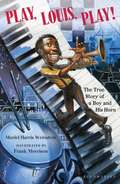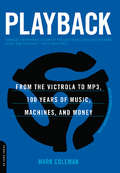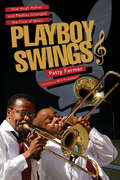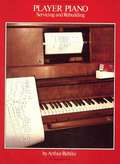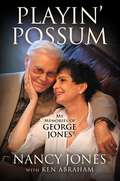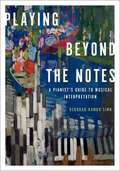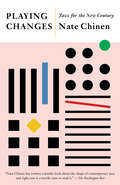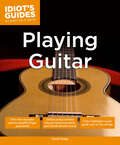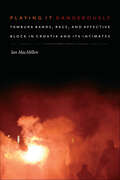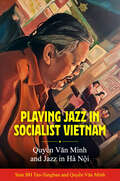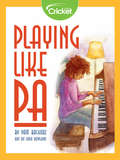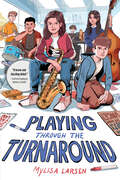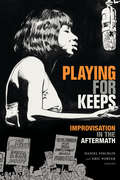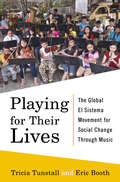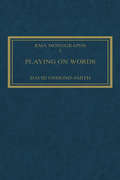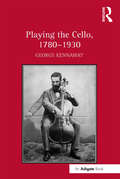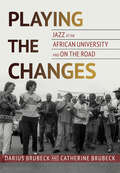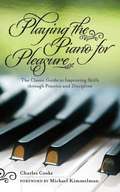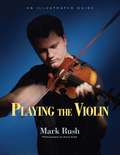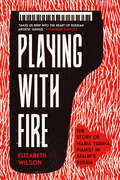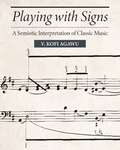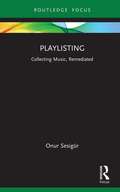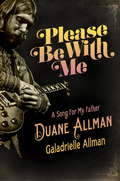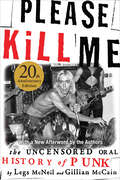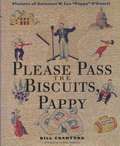- Table View
- List View
Play, Louis, Play!: The True Story of a Boy and his Horn
by Muriel Harris WeinsteinThe book delivers a rollicking biography of jazz great Louis Armstrong's childhood, told from the perspective of his dearest companion--his horn.
Playback: From the Victrola to MP3, 100 Years of Music, Machines, and Money
by Mark ColemanPlayback is the first book to place the fascinating history of sound reproduction within its larger social, economic, and cultural context-and includes appearances by everyone from Thomas Edison to En
Playboy Swings: How Hugh Hefner and Playboy Changed the Face of Music
by Will Friedwald Patty FarmerPlayboy—the magazine, the empire, the lifestyle—is one of the world’s best-known brands. Since the launch of Playboy magazine in 1953, two elements have been remarkably consistent: the first, obviously, is the celebration of nubile, female flesh. The second, readers may be surprised to learn, is Playboy’s involvement in the music scene. The Playboy experience was never just about sex but about lifestyle. Music—particularly the finest jazz, a personal passion of Hefner’s—has always been an essential component of that lifestyle. Playboy Swings focuses specifically on Playboy’s involvement in the music scene, its impact on popular entertainment (and vice versa), and the fabulous cadre of performers who took to the stages of the mythic Playboy Clubs and Jazz Festivals. Throughout Playboy Swings, Farmer demonstrates how Playboy helped change the world through music by integrating the TV shows, festivals, and the clubs.Complied through interviews with hundreds of people who were on the scene throughout Playboy’s rise, fall, and on-going renaissance, Playboy Swings carries readers on a seductive journey through the history of the empire—all the while focusing on the musical entertainment that made it unique. Hef’s personal passion for music—and his belief in it as a cornerstone of the Playboy ethos—has expressed itself in a wide range of media over Playboy’s 60-year history, and all of it comes alive in these pages. Famer takes the reader from the inception of the Playboy empire through the 1959 jazz festival, to the opening of club after club.With approximately 60 black and white photos, and a complete Playboy music reference guide, readers will think of music, not just Bunnies, when thinking about Playboy.Throughout the book, it is the artists who do most of the talking—and they have a lot to say about the golden era of Playboy entertainment.
Player Piano
by Arthur A. ReblitzA treatise on how player pianos function, and how to get them back into top playing condition if they don't work. For beginners and experienced technicians alike.
Playin' Possum: My Memories of George Jones
by Nancy JonesIn Playin' Possum, readers get an intimate look at country music legend George Jones through the eyes of his wife of thirty years.Ask anyone who knows country music, &“Who was the GOAT—the greatest of all time?&” and the answers will inevitably lead to George Jones. Millions of people know the name of the iconic country music artist, George Jones, but few people know that behind the man and his golden voice was a strong, feisty woman who not only saved his life from cocaine addiction, alcoholism, and other abusive and self-destructive behaviors, but also was instrumental in saving his soul. Legends, half-truths, and downright lies abound about the iconic singer, but what secrets do people not know about him? What was it like to live with him through the darkest shadows and in the brightest of lights? Married for more than thirty years to the greatest country music singer who ever lived, the man Frank Sinatra had whimsically referred to as &“the second-greatest singer in America,&” Nancy Jones knew George Jones better than anyone else on earth—the good George and the bad George, the horrendous, and the hilarious. George and Nancy married March 4, 1983, and with her help and encouragement, he quit his wild and wicked ways—for a while. Nancy soon learned, however, that the demons held a strong grip on the man she loved, and they were not about to release him without a fight. But Nancy Jones is a tenacious fighter, and most people who knew &“the Possum,&” credit Nancy with saving his life and rebuilding his career. For the first time, in Playin' Possum, Nancy Jones reveals the true &“insider&” perspectives and little known poignant and as well as humorous stories about the country music icon—his battles with cocaine, alcohol, abusive behavior toward her and others, his battles with himself, and most of all, his battles against the demons that sought to control him and ultimately destroy him. Nancy knew there was a good man inside George Jones, and she felt strongly that God had given her the assignment to help him, even if he hurt her. She refused to give up on Jones. Although Tammy Wynette sang &“Stand By Your Man,&” it was actually Nancy Jones who stood by George for more than thirty years, and helped bring him to the Light. Together, they brought joy and light to millions of people.
Playing Beyond The Notes: A Pianist's Guide to Musical Interpretation
by Deborah Rambo SinnThis book demystifies the complex topic of musical interpretation by boiling it down to basic principles in an accessible writing style. The book targets pianists, piano teachers, and piano pedagogy students and incorporates over 200 musical examples from the intermediate and advanced piano repertoire.
Playing Changes: Jazz for the New Century
by Nate ChinenOne of jazz’s leading critics gives us an invigorating, richly detailed portrait of the artists and events that have shaped the music of our time. Grounded in authority and brimming with style, Playing Changes is the first book to take the measure of this exhilarating moment: it is a compelling argument for the resiliency of the art form and a rejoinder to any claims about its calcification or demise.“Playing changes,” in jazz parlance, has long referred to an improviser’s resourceful path through a chord progression. Playing Changes boldly expands on the idea, highlighting a host of significant changes—ideological, technological, theoretical, and practical—that jazz musicians have learned to navigate since the turn of the century. Nate Chinen, who has chronicled this evolution firsthand throughout his journalistic career, vividly sets the backdrop, charting the origins of jazz historicism and the rise of an institutional framework for the music. He traces the influence of commercialized jazz education and reflects on the implications of a globalized jazz ecology. He unpacks the synergies between jazz and postmillennial hip-hop and R&B, illuminating an emergent rhythm signature for the music. And he shows how a new generation of shape-shifting elders, including Wayne Shorter and Henry Threadgill, have moved the aesthetic center of the music. Woven throughout the book is a vibrant cast of characters—from the saxophonists Steve Coleman and Kamasi Washington to the pianists Jason Moran and Vijay Iyer to the bassist and singer Esperanza Spalding—who have exerted an important influence on the scene. This is an adaptive new music for a complex new reality, and Playing Changes is the definitive guide.
Playing Guitar (Idiot's Guides)
by David HodgeLearning to play the guitar has never been easier! Idiot&’s Guides®: Playing Guitar begins with an introduction to different types of guitars and their parts, followed by helpful information on how to choose a guitar. You&’ll learn how to tune the guitar (supplemented with online audio), how to correctly hold it, how to read tablature, and about basic rhythm. Much of the remainder of the book gives you easy-to-follow instructions on learning chords, and each lesson is followed by a fun practice session and a simple song with which to practice the newly learned chords. In addition to over-the-shoulder color photos showing fingering positions and accompanying two-color chord charts that show exactly what to do, you can hear the chords, exercises, and songs performed from additional content online.
Playing It Dangerously: Tambura Bands, Race, and Affective Block in Croatia and Its Intimates (Music / Culture)
by Ian MacMillenPlaying It Dangerously questions what happens when feelings attached to popular music conflict with expressions of the dominant socio-cultural order, and how this tension enters into the politics of popular culture at various levels of human interaction. Tambura is a genre-crossing performance practice centered on an eponymous stringed instrument, part of the mandolin family, that Roma, Croats, and Serbs adopted from Ottoman forces. The acclamation that one "plays dangerously" connotes exceptional virtuosic improvisation and rapid finger technique and is the highest praise that a (typically male) musician can receive from his peers. The book considers tambura music as a site of both contestation and reconciliation since its propagation as Croatia's national instrument during the 1990s Yugoslav wars. New sensibilities of 'danger' and of race (for instance, 'Gypsiness') arose as Croatian bands reterritorialized musical milieus through the new state, reestablishing transnational performance networks with Croats abroad, and reclaiming demilitarized zones and churches as sites of patriotic performance after years of 'Yugoslavian control.' The study combines ethnographic fieldwork with archival research and music analysis to expound affective block: a theory of the dialectical dynamics between affective and discursive responses to differences in playing styles. A corrective to the scholarly stress on music scenes saturated with feeling, the book argues for affect's social regulation, showing how the blocking of dangerous intensities ultimately privileges constructions of tambura players as heroic male Croats, even as the music engenders diverse racial and gendered becomings.
Playing Jazz in Socialist Vietnam: Quyền Văn Minh and Jazz in Hà Nội
by Stan BH Tan-Tangbau Văn Minh QuyềnShortlisted for the EuroSEAS Humanities Book Prize 2022Quyền Văn Minh (b. 1954) is not only a jazz saxophonist and lecturer at the prestigious Vietnam National Academy of Music, but he is also one of the most preeminent jazz musicians in Vietnam. Considered a pioneer in the country, Minh is often publicly recognized as the “godfather of Vietnamese jazz.” Playing Jazz in Socialist Vietnam tells the story of the music as it intertwined with Minh’s own narrative. Stan BH Tan-Tangbau details Minh’s life story, telling how Minh pioneered jazz as an original genre even while navigating the trials and tribulations of a fervent socialist revolution, of the ideological battle that was the Cold War, of Vietnam’s war against the United States, and of the political changes during the Đổi Mới period between the mid-1980s and the 1990s. Minh worked tirelessly and delivered two breakthrough solo recitals in 1988 and 1989, marking the first time jazz was performed in the public sphere in the socialist state. To gain jazz acceptance as a mainstream musical art form, Minh founded Minh Jazz Club. With the release of his debut album of original compositions in 2000, Minh shaped the nascent genre of Vietnamese jazz. Minh’s endeavors kickstarted the momentum, from his performing jazz in public, teaching jazz both formally and informally, and contributing to the shaping of an original Vietnamese voice to stand out among the many styles in the jazz world. Most importantly, Minh generated a public space for musicians to play and for the Vietnamese to listen. His work eventually helped to gain jazz the credibility necessary at the national conservatoire to offer instruction in a professional music education program.
Playing Like Pa
by Pam BachorzStella listens to her grandpa play piano at the Tulip Café for the final time before he retires.
Playing Through the Turnaround
by Mylisa LarsenIn a timely, insightful story told with sparkling wit and heart, young musicians protesting plans for budget cuts navigate miscalculations, indifferent adults, and unexpected loss as they discover the power of speaking out and the value of listening.“A brave and dazzling debut, this timely novel is a blueprint for hope.”—Katherine Applegate, Newbery Medalist and best-selling author of The One and Only Ivan“Keen and clear and fiercely funny.”—Linda Sue Park, Newbery Medalist and best-selling author of A Long Walk to Water“Brilliant, sharp, comic, poignant, and true.”— Gary D. Schmidt, two-time Newbery Honor-winning author of The Wednesday Wars“A splendid novel filled with honesty and heart.”—Karina Yan Glaser, best-selling author of the Vanderbeekers series.Fifth period is hands down the best time of day in Connor U. Eubanks Middle School, because that’s when Mr. Lewis teaches Jazz Lab. So his students are devastated when their beloved teacher quits abruptly. Once they make a connection between budget cuts and Mr. Lewis’s disappearance, they hatch a plan: stop the cuts, save their class.Soon, they become an unlikely band of crusaders, and their quest quickly snowballs into something much bigger—a movement involving the whole middle school. But the adults in charge seem determined to ignore their every protest. How can the kids make themselves heard?
Playing for Keeps: Improvisation in the Aftermath (Improvisation, Community, and Social Practice)
by Eric Porter Daniel FischlinThe contributors to Playing for Keeps examine the ways in which musical improvisation can serve as a method for negotiating violence, trauma, systemic inequality, and the aftermaths of war and colonialism. Outlining the relation of improvisatory practices to local and global power structures, they show how in sites as varied as South Africa, Canada, Egypt, the United States, and the Canary Islands, improvisation provides the means for its participants to address the past and imagine the future. In addition to essays, the volume features a poem by saxophonist Matana Roberts, an interview with pianist Vijay Iyer about his work with U.S. veterans of color, and drawings by artist Randy DuBurke that chart Nina Simone's politicization. Throughout, the contributors illustrate how improvisation functions as a model for political, cultural, and ethical dialogue and action that can foster the creation of alternate modes of being and knowing in the world.Contributors. Randy DuBurke, Rana El Kadi, Kevin Fellezs, Daniel Fischlin, Kate Galloway, Reem Abdul Hadi, Vijay Iyer, Mark Lomanno, Moshe Morad, Eric Porter, Sara Ramshaw, Matana Roberts, Darci Sprengel, Paul Stapleton, Odeh Turjman, Stephanie Vos
Playing for Their Lives: The Global El Sistema Movement for Social Change Through Music
by Tricia Tunstall Eric BoothAn eye-opening view of the unprecedented global spread of El Sistema--intensive music education that disrupts the cycles of poverty. In some of the bleakest corners of the world, an unprecedented movement is taking root. From the favelas of Brazil to the Maori villages in New Zealand, from occupied Palestine to South Central Los Angeles, musicians with strong social consciences are founding intensive orchestra programs for children in need. In this captivating and inspiring account, authors Tricia Tunstall and Eric Booth tell the remarkable story of the international El Sistema movement. A program that started over four decades ago with a handful of music students in a parking garage in Caracas, El Sistema has evolved into one of classical music's most vibrant new expressions and one of the world's most promising social initiatives. Now with more than 700,000 students in Venezuela, El Sistema's central message--that music can be a powerful tool for social change--has burst borders to grow in 64 countries (and that number increases steadily) across the globe. To discover what makes this movement successful across the radically different cultures that have embraced it, the authors traveled to 25 countries, where they discovered programs thriving even in communities ravaged by poverty, violence, or political unrest. At the heart of each program is a deep commitment to inclusivity. There are no auditions or entry costs, so El Sistema's doors are open to any child who wants to learn music--or simply needs a place to belong. While intensive music-making may seem an unlikely solution to intractable poverty, this book bears witness to a program that is producing tangible changes in the lives of children and their communities. The authors conclude with a compelling and practicable call to action, highlighting civic and corporate collaborations that have proven successful in communities around the world.
Playing on Words: A Guide to Luciano Berio's Sinfonia (Royal Musical Association Monographs #1)
by David Osmond-SmithLuciano Berio's Sinfonia (1968) marked a return by the composer to orchestral writing after a gap of six years. This in-depth study demonstrates the central position the work occupies in Berio's output. David Osmond-Smith discusses the way in which Berio used the Bororo myth described in Levi-Strauss's Le cru et le cuit as a framework for Sinfonia. This is one of many influences in the work, which also include Joyce's 'Sirens' chapter from Ulysses, Beckett's The Unnameable and the scherzo from Mahler's 2nd Symphony. The listener who takes refuge in the score of Sinfonia, argues Osmond-Smith, finds there a maze of allusions to things beyond the score. It is some of those allusions that this book seeks to illuminate.
Playing the Cello, 1780-1930
by George KennawayThis innovative study of nineteenth-century cellists and cello playing shows how simple concepts of posture, technique and expression changed over time, while acknowledging that many different practices co-existed. By placing an awareness of this diversity at the centre of an historical narrative, George Kennaway has produced a unique cultural history of performance practices. In addition to drawing upon an unusually wide range of source materials - from instructional methods to poetry, novels and film - Kennaway acknowledges the instability and ambiguity of the data that supports historically informed performance. By examining nineteenth-century assumptions about the very nature of the cello itself, he demonstrates new ways of thinking about historical performance today. Kennaway’s treatment of tone quality and projection, and of posture, bow-strokes and fingering, is informed by his practical insights as a professional cellist and teacher. Vibrato and portamento are examined in the context of an increasing divergence between theory and practice, as seen in printed sources and heard in early cello recordings. Kennaway also explores differing nineteenth-century views of the cello’s gendered identity and the relevance of these cultural tropes to contemporary performance. By accepting the diversity and ambiguity of nineteenth-century sources, and by resisting oversimplified solutions, Kennaway has produced a nuanced performing history that will challenge and engage musicologists and performers alike.
Playing the Changes: Jazz at an African University and on the Road
by Darius Brubeck Catherine BrubeckCatherine and Darius Brubeck’s 1983 move to South Africa launched them on a journey that helped transform jazz education. Blending biography with storytelling, the pair recount their time at the University of KwaZulu-Natal, where they built a pioneering academic program in jazz music and managed and organized bands, concerts, and tours around the world. The Brubecks and the musicians faced innumerable obstacles, from the intensification of apartheid and a lack of resources to the hardscrabble lives that forced even the most talented artists to the margins. Building a program grounded in multi-culturalism, Catherine and Darius encouraged black and white musicians to explore and expand the landscape of South African jazz together Their story details the sometimes wily, sometimes hilarious problem-solving necessary to move the institution forward while offering insightful portraits of South African jazz players at work, on stage, and providing a soundtrack to the freedom struggle and its aftermath. Frank and richly detailed, Playing the Changes provides insiders’ accounts of how jazz intertwined with struggle and both expressed and resisted the bitter unfairness of apartheid-era South Africa.
Playing the Piano for Pleasure: The Classic Guide to Improving Skills Through Practice and Discipline
by Charles Cooke Michael KimmelmanSkyhorse Publishing is proud to revive Playing Piano for Pleasure. With the wonderful writing one would expect from a longtime New Yorker reporter, Piano aficionado Charles Cooke, offers concrete routines for improving your piano performance. A pleasant and constant cheerleader, Cooke asks readers to practice every day, suggesting that they work through just that section time and again until it is perfect. In addition to his own thoughts, Cooke includes material from his interviews with master pianists, artists, and writers. The result is a book that should be cherished for years to come.
Playing the Violin
by Mark RushDrawing on twenty years of teaching experience, author Mark Rush systematically builds the fundamentals of violin playing from the ground up. The book focuses on proper setup from how to stand, to holding the violin, to the best way to move the bow. These are fundamental components necessary for success and the earlier these good habits are established the better.
Playing with Fire: The Story of Maria Yudina, Pianist in Stalin's Russia
by Elizabeth WilsonThe first full biography of the fearless and brilliant Maria Yudina, a legendary pianist who was central to Russian intellectual life Maria Yudina was no ordinary musician. An incredibly popular pianist, she lived on the fringes of Soviet society and had close friendships with such towering figures as Boris Pasternak, Pavel Florensky, and Mikhail Bakhtin. Legend has it that she was Stalin&’s favorite pianist. Yudina was at the height of her fame during WWII, broadcasting almost daily on the radio, playing concerts for the wounded and troops in hospitals and on submarines, and performing for the inhabitants of besieged Leningrad. By the last years of her life, she had been dismissed for ideological reasons from the three institutions where she taught. And yet according to Shostakovich, Yudina remained &“a special case. . . . The ocean was only knee-deep for her.&” In this engaging biography, Elizabeth Wilson sets Yudina&’s extraordinary life within the context of her times, where her musical career is measured against the intense intellectual and religious ferment of the post-revolutionary period and the ensuing years of Soviet repression.
Playing with Signs: A Semiotic Interpretation of Classic Music
by V. Kofi AgawuAn award-winning account of the importance of semiotic play in Classic instrumental music, including that of Mozart, Haydn, and BeethovenOf all the repertories of Western Art music, none is as explicitly listener-oriented as that of the late eighteenth and early nineteenth centuries. Yet few attempts to analyze the so-called Classic Style have embraced the semiotic implications of this fact. In Playing with Signs, Kofi Agawu proposes a listener-oriented theory of Classic instrumental music that encompasses its two most fundamental communicative dimensions: expression and structure.Units of expression, defined in reference to topoi, are shown here to interact with, confront, and merge into units of structure, defined in terms of the rhetorical conventions of beginning, continuing, and ending. The book draws on examples from works by Mozart, Haydn, and Beethoven to show that the explicitly referential, even theatrical, surface of Classic music derives from a play with signs. Although addressed primarily to readers interested in musical analysis, the book opens fruitful avenues for further research into musical semiotics, aesthetics, and Classicism.
Playlisting: Collecting Music, Remediated (Routledge Focus on Digital Media and Culture)
by Onur SesigürThis book examines the collection and curation of music, and the way digital streaming services are transforming the way we engage with the media. The study foregrounds personal digital curation techniques, rather than algorithms or technology, to acknowledge the sustaining human agency involved in playlisting. The author looks at Digital Service Providers such as Spotify, Apple and Deezer, which offer their users not just access to large collections of music, but also the opportunity to create and maintain personalised consumption subsets such as playlists. Positioning these current playlisting practices as a remediation of significant cultural practices of the 20th century – such as collecting records and mix-taping – the book highlights the continuity of culture through media change, and the implications for concepts of self and identity, society and sharing. Shedding new light on this contemporary cultural phenomenon, this book will be an important read for scholars who are interested in the area of digital music from different disciplines such as communication, digital humanities and social sciences in fields of media studies, digital cultures, personal information management, digital curation and popular music.
Please Be with Me: A Song for My Father, Duane Allman
by Galadrielle AllmanA deeply personal, revealing, and lyrical portrait of Duane Allman, founder of the legendary Allman Brothers Band, written by his daughter Galadrielle Allman went to her first concert as an infant in diapers, held in her teenage mother's arms. Playing was her father--Duane Allman, who would become one of the most influential and sought-after musicians of his time. Just a few short years into his remarkable career, he was killed in a motorcycle accident at the age of twenty-four. His daughter was two years old. Galadrielle was raised in the shadow of his loss and his fame. Her mother sought solace in a bohemian life. Friends and family found it too painful to talk about Duane. Galadrielle listened intently to his music, read articles about him, steeped herself in the mythic stories, and yet the spotlight rendered him too simple and too perfect to know. She felt a strange kinship to the fans who longed for him, but she needed to know more. It took her many years to accept that his life and his legacy were hers, and when she did, she began to ask for stories--from family, fellow musicians, friends--and they began to flow. Galadrielle Allman's memoir is at once a rapturous, riveting, and intimate account of one of the greatest guitar prodigies of all time, the story of the birth of a band that redefined the American musical landscape, and a tender inquiry of a daughter searching for her father in the memories of others.Praise for Please Be with Me "Duane Allman was my big brother, my partner, my best friend. I thought I knew everything there was to know about him, but Galadrielle's deep and insightful book came as a revelation to me, as it will to everyone who reads it."--Gregg Allman"Galadrielle Allman offers a moving and poetic portrait of her late father."--Rolling Stone "Poignant and illuminating . . . brings Duane Allman to life in a way that no other biography will ever be able to do."--BookPage "[Allman's] descriptions and scenes are vivid, even cinematic. . . . The pleasure of reading Please Be With Me lies as much in its lyrical prose as in its insider anecdotes."--Newsweek "A compelling and intimate portrait of Duane."--The Hollywood Reporter "Illuminating."--Kirkus Reviews "Frequently touching . . . Readers will come away feeling more connected to the man and his music."--Publishers Weekly"The most moving music biography I've ever read. Better than that, Galadrielle has uncovered the heart and motivations, the desolation and saving graces, of the man, and lays it plain in a born-to-write southern voice. She has looked into absence, and from it she has salvaged two hearts: her father's and her own."--Mikal Gilmore, author of Shot in the Heart "This story invites us to savor our own secret intersection of nostalgia and emotional mercy, and it feels very, very good to have soulful, elegant company as we do."--Sheila Weller, author of the New York Times bestseller Girls Like Us: Carole King, Joni Mitchell, Carly Simon--and the Journey of a GenerationFrom the Hardcover edition.ormed. But beyond that vibrant portrait is a comfort. We all idealize someone who left us long ago; we all romanticize some memory. This story invites us to savor our own secret intersection of nostalgia and emotional mercy, and it feels very, very good to have soulful, elegant company as we do."--Sheila Weller, author of the New York Times bestseller Girls Like Us: Carole King, Joni Mitchell, Carly Simon--and the Journey of a GenerationFrom the Hardcover edition.
Please Kill Me: The Uncensored Oral History of Punk
by Legs McNeil Gillian McCainThe twentieth anniversary edition of the &“utterly and shamelessly sensational&” history of punk music—featuring new photos and an afterword by the authors (Newsday). A contemporary classic, Please Kill Me is the definitive oral history of the most nihilistic of all pop movements. Iggy Pop, Lou Reed, Richard Hell, the Ramones, and scores of other punk figures lend their voices to this decisive account of that explosive era. Editors Legs McNeil and Gillian McCain—two of punk music&’s greatest chroniclers—follow the movement from its roots in the 1960s underground of New York City, to its arrival in the UK with bands like The Sex Pistols and The Clash, to its unlikely emergence as a global cultural force whose impact is still felt today.
Please Pass the Biscuits, Pappy: Pictures of Governor W. Lee "Pappy" O'Daniel
by John Anderson Bill CrawfordLong before movie stars Ronald Reagan and Arnold Schwarzenegger became governors of California, a popular radio personality with no previous political experience—who wasn't even registered to vote—swept into the governor's office of Texas. W. Lee "Pappy" O'Daniel was a 1930s businessman who discovered the power of radio to sell flour.<P><P> His musical shows with the Light Crust Doughboys (which launched the career of Bob Wills) and his radio homilies extolling family and Christian values found a vast, enthusiastic audience in Depression-era Texas. When Pappy decided to run for governor in 1938 as a way to sell more flour—a fact he proudly proclaimed throughout the campaign—the people of Texas voted for him in record numbers. And despite the ineptitude for politics he displayed once in office, Texans returned him to the governorship in 1940 and then elected him to the U.S. Senate in 1941 in a special election in which he defeated Lyndon Johnson, as well as to a full term as senator in 1942.
